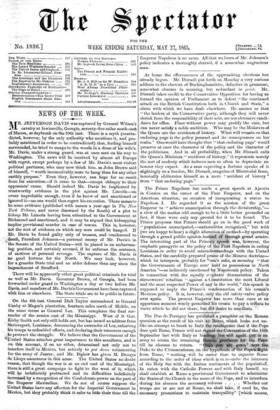At home the effervescence of the approaching elections has already
begun. Mr. Disraeli put forth on Monday a very curious address to the electors of Buckinghamshire, defective in grammar, somewhat obscure in meaning, but redundant in point. Mr. Disraeli takes credit to the Conservative Opposition for having so formed the opinion of Parliament as to defeat " the continued attack on the British Constitution both in Church and State," a claim with which we have dealt elsewhere. He assures us that "the leaders of the Conservative party, although they will never shrink from the responsibility of their acts, are not obtrusive candi- dates for office. Place without power may gratify the vain, but can never satisfy a noble ambition. Who may be the Ministers of the Queen are the accidents of history. What will remain on that enduring page is the policy pursued and its consequences on her realm." One would have thought that " that enduring page" would preserve at once the character of the policy and the character of the politicians. And in all probability, when Mr. Disraeli calls the Queen's Ministers " accidents of history," it represents merely the sort of modesty which induces men so often to depreciate an honour they expect. As a man expecting a fortune speaks of it slightingly as a burden, Mr; Disraeli, sanguine of Ministerial fame, heroically obliterates himself as a mere " accident of history" from " that enduring page."


































